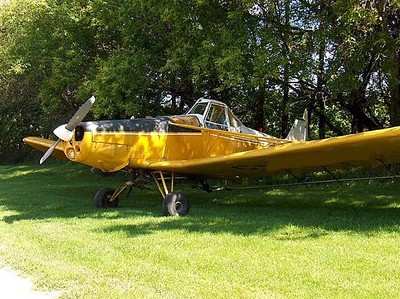Mon, Nov 08, 2004
TSA Issues Alert For Stolen Aircraft
A crop dusting aircraft was stolen from Ejido Queretaro, near
Mexicali, Mexico and has now become the subject of an intensive TSA
search. Although there is currently no indication that this has any
connection to terrorist activity, the theft is cause for concern.
Past information indicates that members of al-Qaida may have
planned—or may still be planning—to disperse biological
or chemical agents from crop dusting aircraft.
The stolen aircraft has been identified as a Piper PA 25,
Pawnee. It is registered in Mexico and bears the tail number XBCYP.
If you see the aircraft described above, you should immediately
contact the TSA General Aviation Hotline at (866) 427-3287.

Law enforcement agencies continue to investigate suspicious
incidents and inquiries involving crop dusters and spray equipment.
In September 2001, the National Agricultural Aviation Association
issued an advisory to its members. The advisory warned members to
“be vigilant to any suspicious activity relative to the use,
training in or acquisition of dangerous chemicals or airborne
application of same including threats, unusual purchases,
suspicious behavior by employees or customers, and unusual contacts
with the public.” The advisory also instructed individuals to
report any suspicious circumstances or information to local FBI
offices.
TSA wants to remind aerial application operators and airport
operators to review the security measures contained in the TSA
Information Publication, Security Guidelines for General Aviation
Airports and the National Agricultural Aviation Association
security measures. For example, aerial application operators and
airport operators are encouraged to consider the following:
- Store aircraft and crop protection products in locked hangars
with electronic security systems when not in use.
- Park and disable loader trucks, forklifts, or other equipment
to block aircraft.
- In cases where the aircraft must be left outdoors, use
propeller locks, propeller chains or tiedowns on aircraft.
- Remove batteries from planes and disassemble engines from
unused aircraft.
- Install hidden security switches to prevent unauthorized
startup of the aircraft.
- Outdoor security lighting around hangars and operations is
encouraged.
- Establish contact with Federal and local law enforcement
agencies to coordinate responses to security breaches at
agricultural aviation facilities.
- Encourage operators to list the appropriate law enforcement
agency telephone numbers in a prominent place within their
operations.
If you see anything suspicious, report it immediately to local
law enforcement and the TSA General Aviation Hotline at 866-GASECUR
(866-427-3287).
More News
Performance-Based Navigation (PBN) [ICAO] Area navigation based on performance requirements for aircraft operating along an ATS route, on an instrument approach procedure or in a d>[...]
The Airplane Came To Rest Underneath A Set Of Damaged Power Distribution Lines On The Floor Of A Coulee On June 19, 2025, at 1412 mountain daylight time, a Cessna 172K airplane, N7>[...]
Aero Linx: FAA Managers Association (FAAMA) Recognized by the FAA, FAAMA is a professional association dedicated to the promotion of excellence in public service. The Association i>[...]
From 2023 (YouTube Edition): Jet Central Micro-Turbine Engines Impress Founded in the late-1990s, Mexico City-based Jet Central produces a unique and fascinating line of micro-turb>[...]
Also: ANOTHER Illegal Drone, KidVenture Educational Activities, Record Launches, TSA v Shoes The Senate confirmed Bryan Bedford to become the next Administrator of the FAA, in a ne>[...]
 ANN's Daily Aero-Term (07.10.25): Performance-Based Navigation (PBN) [ICAO]
ANN's Daily Aero-Term (07.10.25): Performance-Based Navigation (PBN) [ICAO] NTSB Prelim: Cessna 172
NTSB Prelim: Cessna 172 ANN's Daily Aero-Linx (07.10.25)
ANN's Daily Aero-Linx (07.10.25) Classic Aero-TV: The Big Business of Diminutive Powerplants
Classic Aero-TV: The Big Business of Diminutive Powerplants Airborne 07.11.25: New FAA Bos, New NASA Boss (Kinda), WB57s Over TX
Airborne 07.11.25: New FAA Bos, New NASA Boss (Kinda), WB57s Over TX



